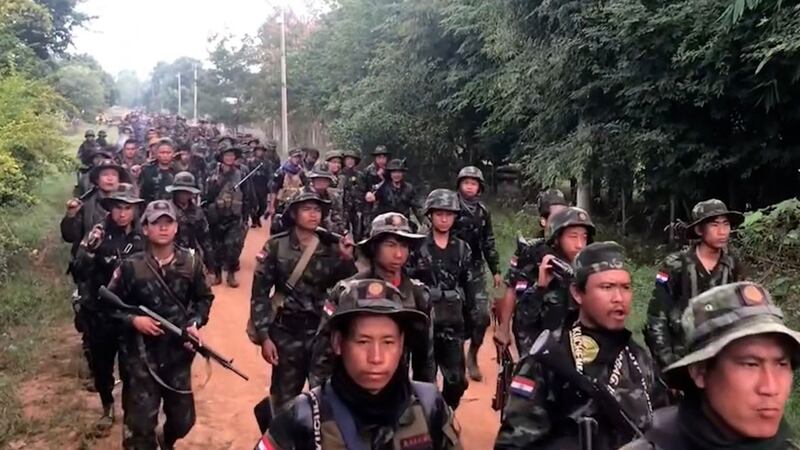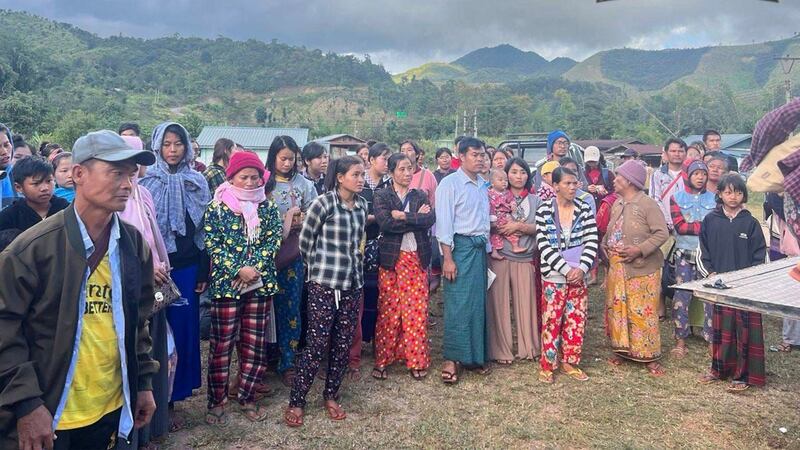One month since launching an offensive against Myanmar’s military in Kayah state, ethnic Karenni joint forces are in control of the regional capital Loikaw and the strategic township of Moebye, the Karenni Army said Monday.
On Nov. 11, the Karenni Army, or KA, Karenni National Defense Force, or KNDF, and anti-junta People’s Defense Force paramilitaries initiated “Operation 1111,” named for the starting date of the campaign, along the shared border between northern Myanmar’s Shan and Kayah states.
Speaking to RFA Burmese on Monday, Col. Phone Naing, the KA’s adjutant general, said the joint forces had captured “all of Moebye township” except for an area where the junta’s Battalion 422 is based, and “80% of Loikaw city.”
“We are carrying out attacks very cautiously to avoid civilian casualties and damage,” he said. “We will first remove all the junta troops, then we will set up an administrative mechanism there.”
On Sunday, the joint Karenni forces captured the Kayah State Police Headquarters under the Home Affairs Ministry, which a KA spokesperson said had allowed resistance fighters to “demolish one of the pillars of the junta” in Loikaw. Details related to the number of casualties and arrest of junta forces were not immediately available.
Banya Khun Aung, the deputy secretary of the Interim Executive Council of Karenni State, or IEC, said that while the military’s administrative mechanism had effectively ground to a halt in Loikaw and Moebye, the Karenni resistance forces have yet to replace it.
“As we are not entirely in control of Loikaw, we have not set up our own administrative system,” he said, noting that people cannot move freely due to restrictions on area roads. “The same rules are being exercised in Moebye. The existing Karenni forces are overseeing security there as it is not ready to begin a transition to the people's administrative system.”

In addition to its Regional Control Command, the junta’s Infantry Battalions 261, 250 and 54, Field Artillery Regiments 356 and 362, No. 7 Military Hospital and Supply and Transport Company 722 are stationed in Loikaw.
The Regional Control Command in Loikaw is responsible for measures of defense, security, military missions and control of militarily important areas on behalf of Eastern Command, according to the military sources.
Strategic Kayah city
Political commentator Than Soe Naing told RFA that Loikaw is key to controlling and supplying other towns in Kayah state, and that both sides are determined to control the city.
“If Loikaw can be captured, it will be the very first liberated area of Kayah state for the KNDF,” he said. “The city is almost under control. However, it cannot be said that it has been fully controlled as the main camp is still in the hands of the junta, and they are still using Loikaw airport for reinforcements and other military supplies.”
Both sides have suffered casualties during Operation 1111, according to the KNDF, which did not provide specific numbers. The group said that 32 junta soldiers had surrendered to Karenni forces during a clash at Loikaw University on Nov. 14 and that 204 people were evacuated from the fighting, including Loikaw University staff and their family members.

Separately, the Karenni Humanitarian Aid Initiative, or KHAI, reported that at least 82 civilians were killed by the junta between the start of Operation 1111 and Dec. 8, including 39 men, 18 women, 12 minors, two novice monks, and 11 people who could not be identified. Among them, 43 were killed in artillery attacks, 24 in airstrikes, and 15 by small arms fire.
KHAI said that the junta carried out 353 airstrikes on Loikaw in the 20 days from Nov. 11-30.
Displaced desperate for aid
A resident of Loikaw told RFA that while fighting in the city has not intensified since Dec. 2, the junta had blocked all roads in and out of the city, creating a shortage of food and medicine.
“If the situation worsens, the need for medical doctors and medical supplies will soar,” said the resident, speaking on condition of anonymity, citing fear of reprisal. “We are carrying out as much rescue work as we can. However, our rescue vehicle was shot up as we returned to Loikaw after taking a person injured by artillery shelling for treatment.”
Sources in Loikaw said that around 10,000 people are trapped there without the means to flee.
A member of KHAI, who also declined to be named, said that those displaced by fighting in Kayah state are in urgent need of humanitarian assistance.
“All the residents of Kayah state have turned into [internally displaced persons], and the need for emergency response is high,” he said. “We call on humanitarian agencies to assist. Not even emergency supplies cannot be provided in the country, so more assistance is needed to evacuate [the displaced] through border crossings and other relief measures.”
Attempts by RFA to contact junta Deputy Information Minister Major-General Zaw Min Tun for comment on the situation in Loikaw and Moebye, as well as numbers of civilian casualties, went unanswered Monday.
Operation 1111 is the second major offensive launched by ethnic armies against the military.
On Oct. 27, the “Three Brotherhood” Alliance of the Myanmar National Democratic Alliance Army, the Arakan Army and the Ta’ang National Liberation Army launched “Operation 1027” in Shan state. Rebels say they have made notable gains against the military in several key cities and claim to have captured more than 170 military outposts since the start of the campaign.
Translated by AungNaing and Htin Aung Kyaw. Edited by Joshua Lipes and Malcolm Foster.
